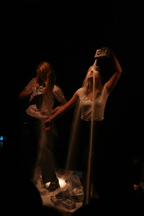




performance
DAH Theatre, Belgrade, Serbia
Dramaturgy and direction: Dijana Milošević
Performers: Maja Mitić, Sanja Krsmanović Tasić, Ivana Milenović
Set-design: Neša Paripović
Costumes: Dah Theatre Research Centre
Sound design: Jugoslav Hadžić
Light design: Radomir Stamenković
The show lasts 55 minutes.
Performance of Dah Theatre Crossing the Line is based on texts from the book Women's Side of War edited by Women in Black organisation (2007). The book is a collection of women's authentic testimonies about wars that had happened on a soil of former republic of Yugoslavia from 1991 till 1999. The book has been formed as a result of one year research by Women in Black, and cooperation with women's nongovernmental organizations in region, who are dealing with the past and humane rights. Most of the texts have been already published in various books and in other publications of these NGOs and they are consisted of testimonies, statements, letters and memories. They are showing specific suffering of women in war, but also their courage and strength for exceeding war trauma and to establish normal life, and also importance of solidarity with women out of all borders and divisions.
All testimonies are in first person, without comments or other kind of use or misuse.
The main goal of the performance is to reach the attendees not only on a verbal but, primarily, on an emotional and psychological level and to stimulate women to start speaking, to note and throughout confession of their own sufferings recognise suffering of others. To develop solidarity and to come to conscious about essence of violence in war. To be more active in democracy processes, to participate in building righteous and long-lasting peace.
--
“In the contemporary world, destruction and violence can only be opposed by the creation of sense” – the founding and continuing motto of DAH Theatre
Jadranka Anđelić and Dijana Milošević formed DAH Theatre in 1991 out of the need for profound experimental work. In 1993 DAH Theatre enlarged its activities by forming the DAH Theatre Research Centre. This is not only a building of bricks but an ongoing program of workshops, lectures, seminars, guest performances and festivals. The work of the Centre is aimed toward a constant exchange of knowledge, experience and ideas amongst artists and participants from various theatrical and national traditions. To be an independent non-governmental group in this country, during the last years, has been a great challenge. Through their work, the members of DAH Theatre have strongly opposed war and violence.
DAH Theatre is an active member in various theatre networks, and toured all around Europe, USA, New Zealand and Australia.
“The performance Crossing the Line speaks, in a tragic tone, about the burden of criminal past lying heavily on the conscience of the Serbian society... Composed of personal accounts of mothers whose children were killed before their own eyes, raped women and women who witnessed different war horrors, it poses the question: How to re-establish trust among the people who once stood on the opposite sides in the war; how to establish a dialogue between traumatic experiences from both sides: between the victim and the innocent one who belongs to the collectivity that victimised the members of the other collectivity on behalf of all its members, including those who had nothing to do with it? How to cross the line of the undisputable crime, the line of everlasting pain, tormenting embitterment and immobilising shame? How can the shame and empathy of those who belonged to the other side be allowed to touch the victims; how to, without fear, reveal to the victims from the other side one’s own emotional compassion from this side?
In order to establish trust between nations and states – actually to relieve the conscience of innocent people on whose behalf crimes were committed without their consent – the state must break up with the policy of crime formally as well. Today, however, when there are people participating in our government who consider Slobodan Milosevic – the embodiment of the national defeat and moral decline that destroyed or ruined everything it touched upon in our country and the neighbourhood – a national hero, it is absurd to even speak of the possible discontinuity with the criminogenic politics of the previous regime. And until this is actually done, the voices of guilty conscience crossing the border will be heard from the areas of alternative culture only.”
Zdravko Paković, Politika Daily Newspaper, 9th May 2009
